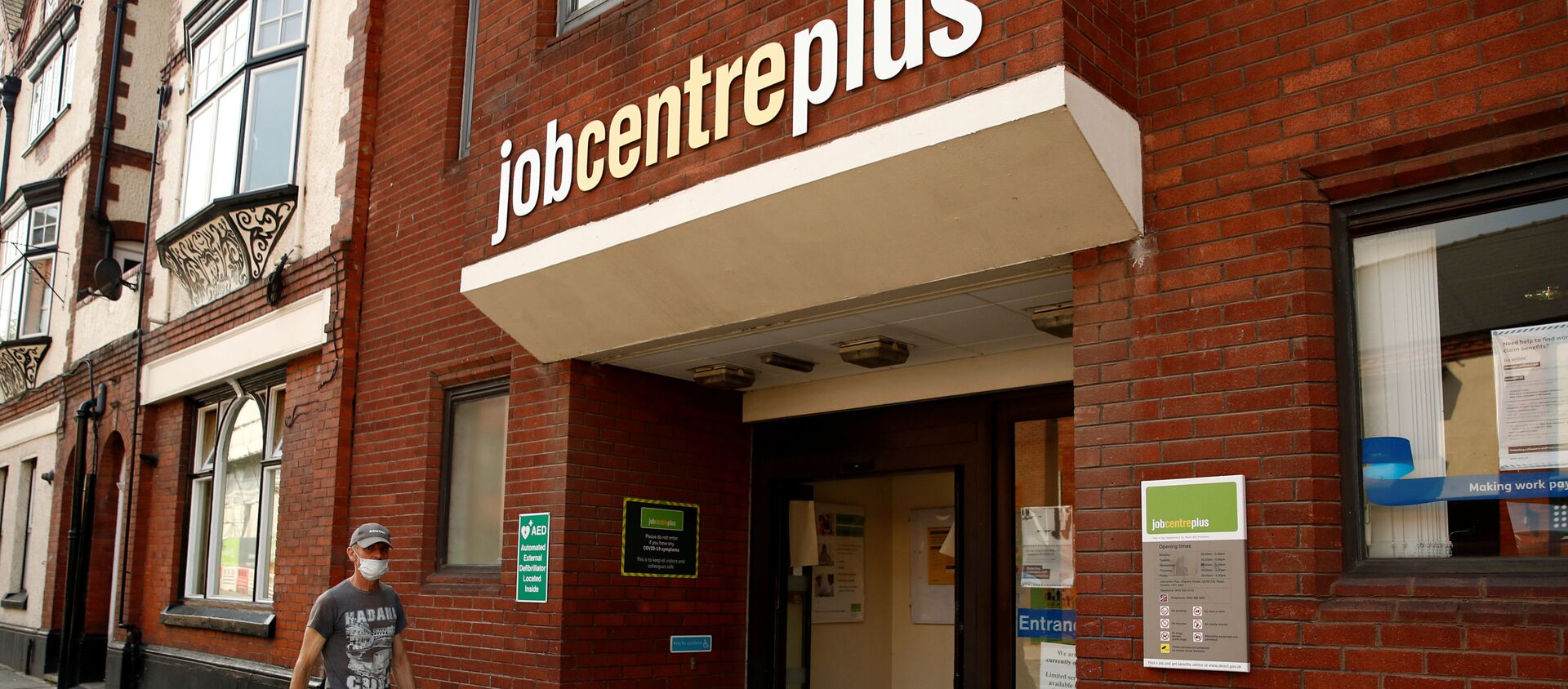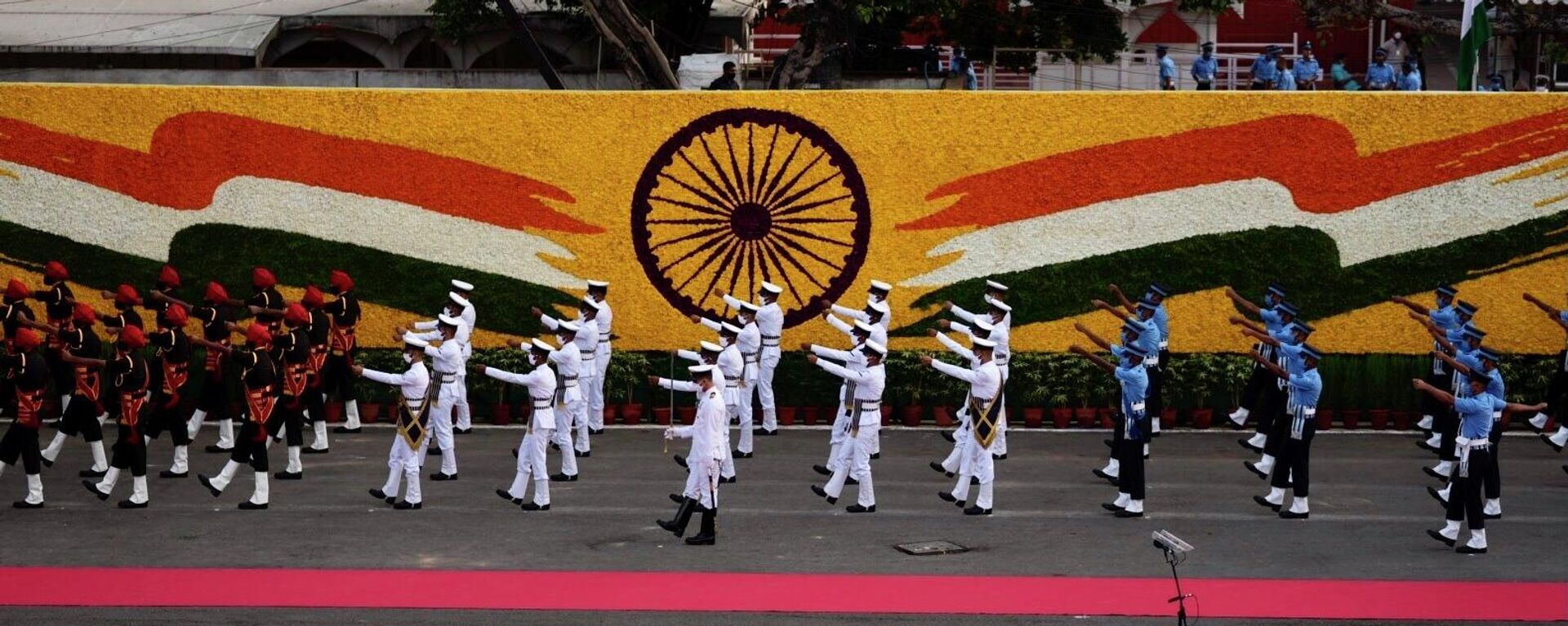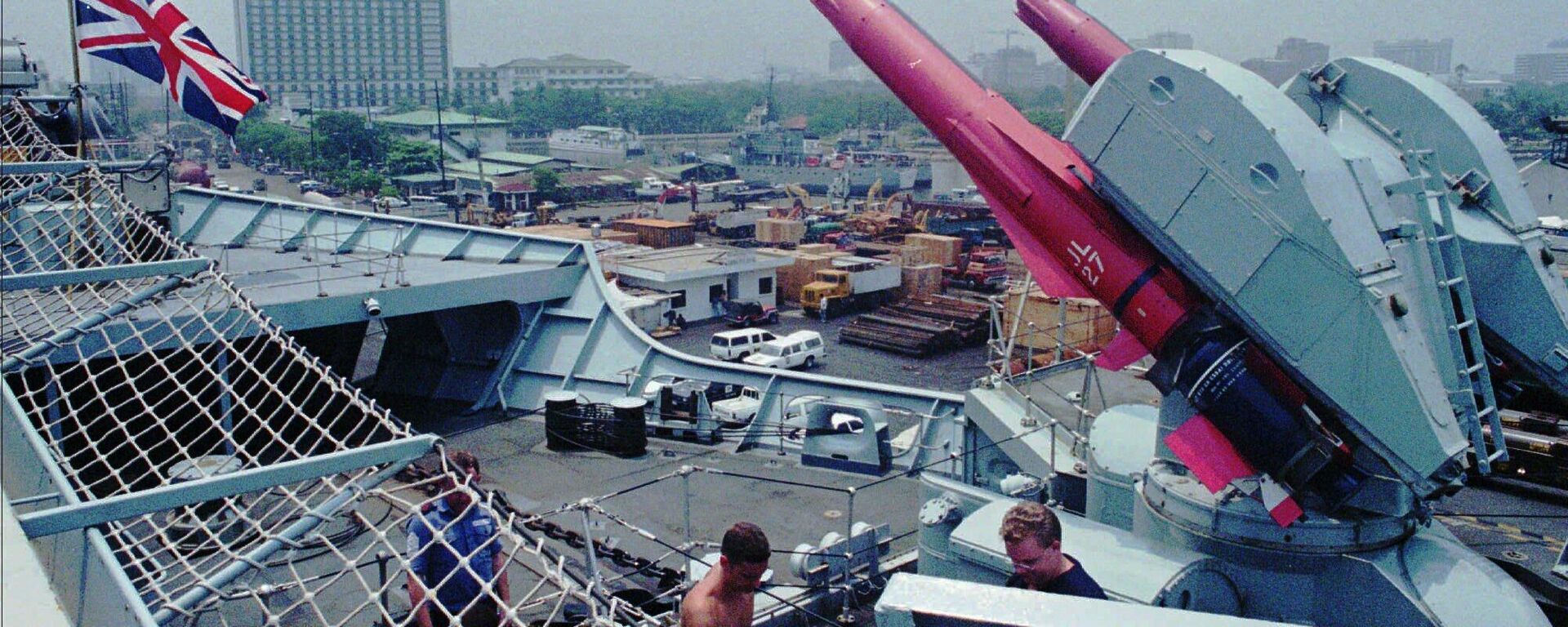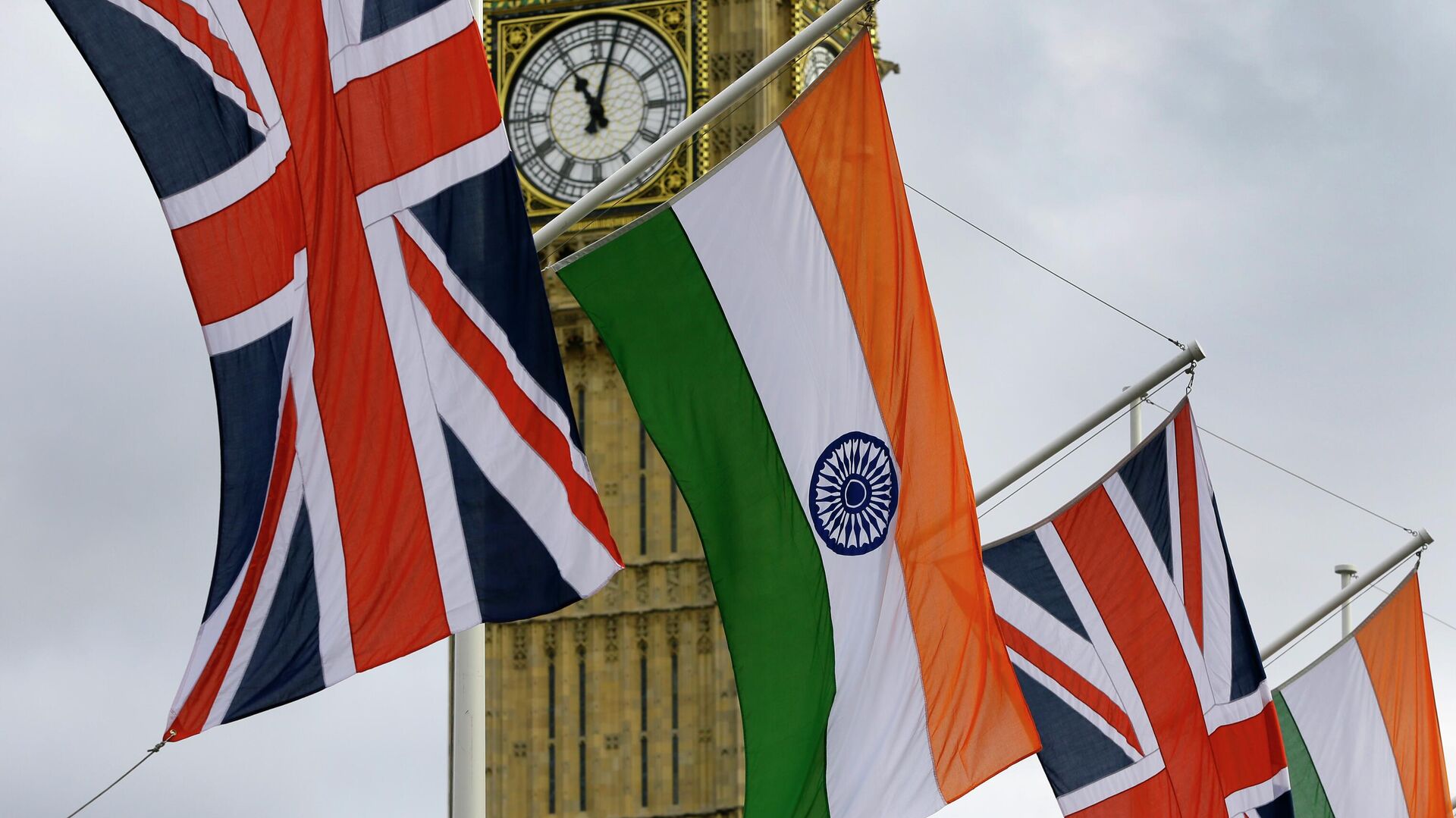https://sputnikglobe.com/20220922/uk-unable-to-pay-reparations-to-ex-colonies-as-it-faces-economic-decline-historian-says-1101070875.html
UK Unable to Pay Reparations to Former Colonies as It Faces 'Economic Decline', Historian Says
UK Unable to Pay Reparations to Former Colonies as It Faces 'Economic Decline', Historian Says
Sputnik International
The debate over whether the United Kingdom should pay trillions of dollars in colonial reparations to its former colonies in Asia, Africa and the Americas has... 22.09.2022, Sputnik International
2022-09-22T08:03+0000
2022-09-22T08:03+0000
2023-05-28T15:21+0000
queen elizabeth ii
british empire
colonialism
imperialism
king charles iii
world
united kingdom (uk)
https://cdn1.img.sputnikglobe.com/img/07e6/09/0a/1100640543_0:167:3049:1882_1920x0_80_0_0_0ad4bfb3165744bcbf7f9b2f10a5f1c2.jpg
Birendra Nath Prasad, an assistant professor at the Center for Historical Studies at India's premier Jawaharlal Nehru University (JNU), spoke to Sputnik about the legacy of colonialism in the developing countries as well as the costs of British rule in India.Excerpts:Sputnik: It is widely perceived that today's economic disparities between the advanced economies and the ‘Global South’ have their roots in colonialism, which makes people think that the advanced economies have a moral obligation to compensate for this imbalance. Should the developing countries seek colonial reparations?Birendra Nath Prasad: Though I support the view that the economic rise of European powers in the 19th and 20th centuries has been driven by economic exploitation of former colonies in Asia, Africa and the Americas, I also think that the narrative that the countries of the Global South are united by their shared colonial experiences is a bit misleading.But yes, many countries, including India and China, do have bitter experiences of colonialism. Though China was never formally colonized, it also has its memories of economic exploitation by the then European colonial powers. On the other hand, India was a former British colony.However, each of the former colonies have now come to develop their own ties with the former colonizers. For instance, Pakistan and India both have different priorities when dealing with the United Kingdom. The same is the case for countries in Africa and the Americas. The idea that all these former colonies will unite to demand reparations from Britain doesn’t seem likely in the near future.More importantly, one must also see whether the UK is in an economic state to pay trillions of dollars in reparations to its former colonies, including India.If the Latin American nations start demanding colonial reparations from Spain, that would take us back to the same question, which is whether Spain is really in a position to compensate them monetarily.Sputnik: How would you describe the economic cost of British colonial rule to India?Prasad: Noted Indian economist Utsa Patnaik and several others have claimed that the British colonizers drained around $45 trillion in taxes and trade from India between 1765 and 1938 (India got independence in 1947).The British disarticulated the Indian economy and turned India into a source of raw materials and cheap labor to fuel its economic rise. Even in the Forties, just years before they left [in 1947], the British transported huge stocks of food from India to British armies fighting the Axis Powers in other parts of Asia during the Second World War. This contributed to a massive famine in India in 1943, leaving nearly 3Mln people in eastern India and modern-day Bangladesh dead.According to various historical estimates, India’s overall contribution to global GDP was around 25 percent before it became part of the British empire. India’s contribution to global GDP dropped to 1 to 2 percent in 1947.India had a strong agricultural industry and an available surplus of food. India’s artisans were renowned for their skill. Indian textiles were available in foreign markets such as in south-east Asia and Africa. The Indian shipping industry has also been very robust since at least the first century AD. Indian vessels have always had a presence in Indian Ocean maritime trade.Indian merchants maintained maritime links with markets of not only south-east Asia and Africa, but also those of China, centuries before the British came and colonized the subcontinent. There are records of south Indian merchants trading in the Chinese port of Canton (near modern-day Guangzhou).Indian maritime traditions in fact predate those of Europeans. Portuguese explorer Vasco Da Gama reported the presence of Indian merchants at the Cape of Good Hope on Africa’s southern tip before the European sailor reached India in 1498 [Da Gama is widely credited with discovering a sea route from Europe to India].Sputnik: What can India do to recover reparation costs from the UK?Prasad: India should never forget the horrors inflicted upon it by British colonizers over nearly two centuries of foreign rule. The wounds inflicted on Indian society from the colonial experience are yet to heal completely.But, as of today, India this month replaced the UK as the world’s fifth-biggest economy. We must note that the Indian economy’s size is $3 trillion, much less than the value of what the British extracted from here.In fact, going by present global economic trends, the nucleus of global economic growth is again shifting to India, China and other developing countries.On the other hand, Britain and most of the other erstwhile European colonizer countries are, to an extent, in a state of economic decline. Britain is well on its way to becoming just a remote island in the Atlantic - just as it was before the Industrial Revolution kicked in in the 18th century.So, the idea that India should ask for economic reparation from the UK might not be a feasible one.However, we are going to witness a change in Indian attitudes towards British colonialism as Indians become more prosperous in coming years.Every generation not only creates its own history, it also rewrites the history written by its predecessors. Such demands for colonial reparations from the UK are only bound to grow in India as the country grows economically.The collective urge to remove official insignia and emblems associated with British colonialism from public and government life will also increase in the years ahead. Just recently, we witnessed the renaming of Rajpath street in New Delhi to Kartavya Path.Sputnik: But shouldn’t the UK return some of the stolen jewels from India, including the famous Koh-i-Noor diamond to compensate for the atrocities of the former colonial government? Do you back the idea that the British monarchy must issue a formal apology for the atrocities committed in India at the time?Prasad: In principle, I support the view that the British monarch owes a formal apology for the atrocities conducted under its watch in India. And not only the Koh-i-Noor diamond, the British government and the monarch must also return the other stolen Indian antiquities such as sculptures of Hindu gods and goddesses, jewels and ornaments that it took away.Although the Koh-i-Noor rightfully belongs to India, the social costs of British colonialism had a much more damaging affect on India.The economic policies had social repercussions, particularly in the modern-day states of Bihar and West Bengal, which had a thriving textile industry. As the raw supplies meant for them were diverted, they were rendered out of work and forced to do jobs they weren’t meant to do. This depressed the social status of entire communities which were previously prosperous.The British imperialists also sought to exploit the caste fault lines in Indian society and worsened it to create a caste divide among upper castes [families situated in the top three categories of the ancient Hindu caste system. The last category comprises Sudras, comprising laborers, cleaners and other blue-collar professions].Contrary to western perception, these fault lines in Hinduism weren’t as pronounced in Indian society as they became after the British came here. In fact, several famous Indian dynasties such as the Mauryas were led by Sudras. We are still firefighting the effects of some of these colonial legacies, which is seen in voting patterns based on caste or the agenda of many political parties.British rule in India was also as ruthless as any other colonial rule. There have been numerous incidents when British used to kill Indians in public and used to hang their bodies from trees for public view. There have been instances of mass shootings, such as the Jallianwala Bagh massacre in Punjab in 1919.Sputnik: The UK has pledged to increase its engagement in the Asia Pacific region after the Brexit vote under its ‘Indo-Pacific tilt’ policy in order to counter China. How should India view this development? In broader terms, does colonial history affect the present relations between India and the UK?Prasad: Well, I don’t see any implications as far as the present India-UK ties are concerned. India, as a whole, has largely forgiven Britain for the colonial atrocities. However, we can never forget that colonial experience.I don’t consider the UK as a global player anymore. The real power among the western nations is concentrated with the US. The US is in many ways the successor state of the so-called Anglo-Saxon civilization which was once controlled by British imperialists.Now, enmity with the US may cost you dearly, but the cost of friendship with Washington could be dearer on many counts.India must not allow itself to be used as a means to contain any other power, including China. I believe that there is enough space in the world for India and China to co-exist peacefully and grow together. It is not a zero-sum game. Of course, there are differences between India and China, including at the border. But one can’t invite bigger trouble to get rid of the present problem.We have all seen the costs to Pakistan after it became a partner to US’ War on Terror in Afghanistan, which was entirely a dispute of Washington. We can’t allow the same fate to befall India.
https://sputnikglobe.com/20200812/uk-enters-record-breaking-recession-you-aint-seen-nothing-yet-1080146413.html
https://sputnikglobe.com/20220921/doing-away-with-british-legacy-indian-army-to-review-colonial-era-practices--insignia-1101045233.html
https://sputnikglobe.com/20220829/truss-reportedly-plans-to-label-china-acute-threat-to-britains-national-security-1100112114.html
united kingdom (uk)
Sputnik International
feedback@sputniknews.com
+74956456601
MIA „Rosiya Segodnya“
2022
News
en_EN
Sputnik International
feedback@sputniknews.com
+74956456601
MIA „Rosiya Segodnya“
Sputnik International
feedback@sputniknews.com
+74956456601
MIA „Rosiya Segodnya“
queen elizabeth ii, british empire, colonialism, imperialism, king charles iii, united kingdom (uk)
queen elizabeth ii, british empire, colonialism, imperialism, king charles iii, united kingdom (uk)
UK Unable to Pay Reparations to Former Colonies as It Faces 'Economic Decline', Historian Says
08:03 GMT 22.09.2022 (Updated: 15:21 GMT 28.05.2023) The debate over whether the United Kingdom should pay trillions of dollars in colonial reparations to its former colonies in Asia, Africa and the Americas has been reinvigorated after the death of Queen Elizabeth II this month.
Birendra Nath Prasad, an assistant professor at the Center for Historical Studies at India's premier Jawaharlal Nehru University (JNU), spoke to Sputnik about the legacy of colonialism in the developing countries as well as the costs of British rule in India.
Sputnik: It is widely perceived that today's economic disparities between the advanced economies and the ‘Global South’ have their roots in colonialism, which makes people think that the advanced economies have a moral obligation to compensate for this imbalance. Should the developing countries seek colonial reparations?
Birendra Nath Prasad: Though I support the view that the economic rise of European powers in the 19th and 20th centuries has been driven by economic exploitation of former colonies in Asia, Africa and the Americas, I also think that the narrative that the countries of the Global South are united by their shared colonial experiences is a bit misleading.
But yes, many countries, including India and China, do have
bitter experiences of colonialism. Though China was never formally colonized, it also has its memories of economic exploitation by the then European colonial powers. On the other hand, India was a former British colony.
However, each of the former colonies have now come to develop their own ties with the former colonizers. For instance, Pakistan and India both have different priorities when dealing with the United Kingdom. The same is the case for countries in Africa and the Americas. The idea that all these former colonies will unite to demand reparations from Britain doesn’t seem likely in the near future.
More importantly, one must also see whether the UK is in an economic state to pay trillions of dollars in reparations to its former colonies, including India.

12 August 2020, 14:58 GMT
If the Latin American nations start demanding colonial reparations from Spain, that would take us back to the same question, which is whether Spain is really in a position to compensate them monetarily.
Sputnik: How would you describe the economic cost of British colonial rule to India?
Prasad: Noted Indian economist Utsa Patnaik and several others have claimed that the British colonizers drained around $45 trillion in taxes and trade from India between 1765 and 1938 (India got independence in 1947).
The British disarticulated the Indian economy and turned India into a source of raw materials and cheap labor to fuel its economic rise.
Even in the Forties, just years before they left [in 1947], the British transported huge stocks of food from India to British armies fighting the Axis Powers in other parts of Asia during the Second World War. This contributed to a massive famine in India in 1943, leaving nearly 3Mln people in eastern India and modern-day Bangladesh dead.
According to various historical estimates, India’s overall contribution to global GDP was around 25 percent before it became part of the British empire. India’s contribution to global GDP dropped to 1 to 2 percent in 1947.
India had a strong agricultural industry and an available surplus of food. India’s artisans were renowned for their skill. Indian textiles were available in foreign markets such as in south-east Asia and Africa. The Indian shipping industry has also been very robust since at least the first century AD. Indian vessels have always had a presence in Indian Ocean maritime trade.
Indian merchants maintained maritime links with markets of not only south-east Asia and Africa, but also those of China, centuries before the British came and colonized the subcontinent. There are records of south Indian merchants trading in the Chinese port of Canton (near modern-day Guangzhou).
Indian maritime traditions in fact predate those of Europeans. Portuguese explorer Vasco Da Gama reported the presence of Indian merchants at the Cape of Good Hope on Africa’s southern tip before the European sailor reached India in 1498 [Da Gama is widely credited with discovering a sea route from Europe to India].
Sputnik: What can India do to recover reparation costs from the UK?
Prasad: India should never forget the horrors inflicted upon it by British colonizers over nearly two centuries of foreign rule. The wounds inflicted on Indian society from the colonial experience are yet to heal completely.
But, as of today, India this month
replaced the UK as the world’s fifth-biggest economy. We must note that the Indian economy’s size is $3 trillion, much less than the value of what the British extracted from here.
In fact, going by present global economic trends, the nucleus of global economic growth is again shifting to India, China and other developing countries.
On the other hand, Britain and most of the other erstwhile European colonizer countries are, to an extent, in a state of economic decline. Britain is well on its way to becoming just a remote island in the Atlantic - just as it was before the Industrial Revolution kicked in in the 18th century.
So, the idea that India should ask for economic reparation from the UK might not be a feasible one.

21 September 2022, 12:55 GMT
However, we are going to witness a change in Indian attitudes towards British colonialism as Indians become more prosperous in coming years.
Every generation not only creates its own history, it also rewrites the history written by its predecessors. Such demands for colonial reparations from the UK are only bound to grow in India as the country grows economically.
The collective urge to remove official insignia and emblems associated with British colonialism from public and government life will also increase in the years ahead. Just recently, we witnessed the renaming of Rajpath street in New Delhi to Kartavya Path.
Sputnik: But shouldn’t the UK return some of the stolen jewels from India, including the famous Koh-i-Noor diamond to compensate for the atrocities of the former colonial government? Do you back the idea that the British monarchy must issue a formal apology for the atrocities committed in India at the time?
Prasad: In principle, I support the view that the British monarch owes a formal apology for the atrocities conducted under its watch in India. And not only the
Koh-i-Noor diamond, the British government and the monarch must also return the other stolen Indian antiquities such as sculptures of Hindu gods and goddesses, jewels and ornaments that it took away.
Although the Koh-i-Noor rightfully belongs to India, the social costs of British colonialism had a much more damaging affect on India.
The economic policies had social repercussions, particularly in the modern-day states of Bihar and West Bengal, which had a thriving textile industry. As the raw supplies meant for them were diverted, they were rendered out of work and forced to do jobs they weren’t meant to do. This depressed the social status of entire communities which were previously prosperous.
The British imperialists also sought to exploit the caste fault lines in Indian society and worsened it to create a caste divide among upper castes [families situated in the top three categories of the ancient Hindu caste system. The last category comprises Sudras, comprising laborers, cleaners and other blue-collar professions].
Contrary to western perception, these fault lines in Hinduism weren’t as pronounced in Indian society as they became after the British came here. In fact, several famous Indian dynasties such as the Mauryas were led by Sudras. We are still firefighting the effects of some of these colonial legacies, which is seen in voting patterns based on caste or the agenda of many political parties.
British rule in India was also as ruthless as any other colonial rule. There have been numerous incidents when British used to kill Indians in public and used to hang their bodies from trees for public view. There have been instances of mass shootings, such as the Jallianwala Bagh massacre in Punjab in 1919.
Sputnik: The UK has pledged to increase its engagement in the Asia Pacific region after the Brexit vote under its ‘Indo-Pacific tilt’ policy in order to counter China. How should India view this development? In broader terms, does colonial history affect the present relations between India and the UK?
Prasad: Well, I don’t see any implications as far as the
present India-UK ties are concerned. India, as a whole, has largely forgiven Britain for the colonial atrocities. However, we can never forget that colonial experience.
I don’t consider the UK as a global player anymore. The real power among the western nations is concentrated with the US. The US is in many ways the successor state of the so-called Anglo-Saxon civilization which was once controlled by British imperialists.

29 August 2022, 10:16 GMT
Now, enmity with the US may cost you dearly, but the cost of friendship with Washington could be dearer on many counts.
India must not allow itself to be used as a means to contain any other power, including China. I believe that there is enough space in the world for India and China to co-exist peacefully and grow together. It is not a zero-sum game. Of course, there are differences between India and China, including at the border. But one can’t invite bigger trouble to get rid of the present problem.
We have all seen the costs to Pakistan after it became a partner to US’ War on Terror in Afghanistan, which was entirely a dispute of Washington. We can’t allow the same fate to befall India.







